Coronavirus: The school of Mum and Dad
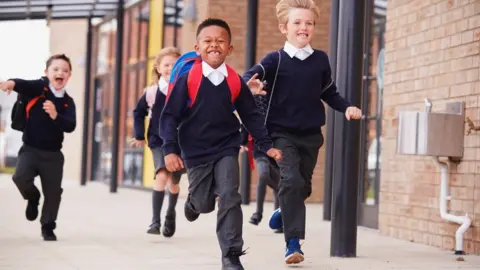 Getty Images
Getty ImagesAll schools in the UK closed their doors on Friday, and there's no timetable for when they might re-open.
Parents, who may need to work and juggle childcare, will have to fill the gap.
While no-one expects them to replicate school, there is plenty of online help to stave off boredom.
Will schools provide the resources?
If your school already puts work online, using Google Classroom or similar software, it is likely that this will continue.
Secondary schools generally make more use of this than primaries, and older pupils are more likely to be in the routine of checking it and completing work. They are also more likely to have their own laptops.
Some school are requesting older children follow their existing timetables, with some active lessons, involving Google Hangouts and virtual classrooms, and some passive lessons, where children get on with work independently.
Each school will have its own system: some will continue to post lessons on Google Classroom daily, others less frequently.
Online systems usually allow for children to submit work and have it marked, but again that will depend on individual schools.
What about other resources?
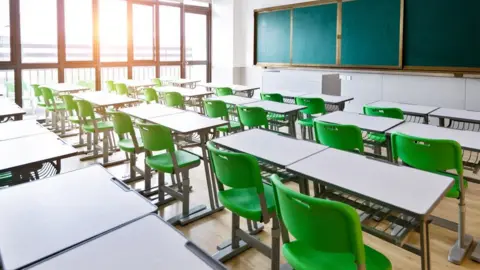 Getty Images
Getty ImagesLots of schools subscribe to websites such as MathsWatch, which director Ken Smith says is experiencing a surge in activity.
"We have been contacted by more than 100 schools looking to join in the last few days and we have four times the traffic we normally have as there are so many teachers on the site creating homework," he said.
Parents are asking how they can access it, but currently it is not available to the public.
Mr Smith said he had considered offering it free to schools that have yet to join but has decided that it "would not be fair".
"If we were to offer it free, it would slow the system down too much," he said.
The website has already added extra processing power in order to cope with increased demand and is ready to add more as the service surges next week.
Mr Smith, a maths teacher for 34 years, has some simple advice for parents who may not have access to online resources or even laptops or tables.
"Buy a text book, go back to basics."
Award-winning app SirLinkalot uses animations to teach children clever tricks to improve spelling.
It has the backing of lexicographer Susie Dent and has just announced that for the duration of the coronavirus outbreak it will be available free to parents and schools.
What other free resources are there?
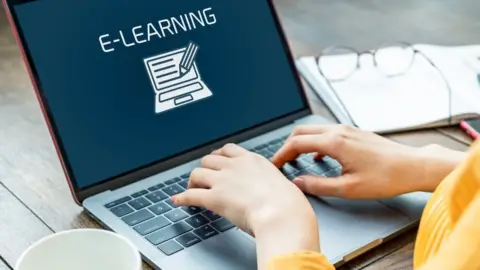 Getty Images
Getty ImagesSchools are likely to send out recommendations along the lines of these, to an Essex-based parents' WhatsApp group:
- BrainPop - offers animated movies on topics in maths, science and English
- Tynker - offers coding lesson for kids
- Creative Bug - offers craft lessons, from knitting to jewellery-making, drawing and origami
Are there any places that cover the curriculum extensively?
BBC Bitesize offers lots of resources that are clearly divided into subject and age categories, and the broadcaster has promised to offer lots more in the coming days.
YouTube's Free School offers a range of videos looking at subjects as diverse as the US constitution, coral reefs and the solar system.
Twinkl has just offered free access to its resources for a month and is providing a simple guide for parents to use it.
And the organisation behind the Ted talks has a division called TED-Ed, full of "lessons worth sharing" from teachers around the globe.
Does online learning work?
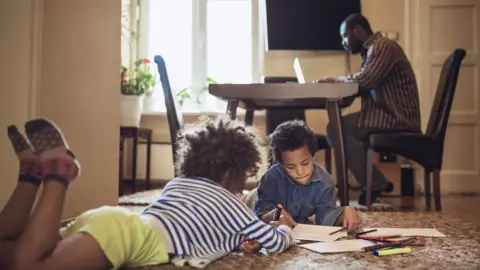 Getty Images
Getty ImagesMany educationalists were arguing long before the coronavirus crisis that the school system needed drastic change.
This is a time to put new ways of learning to the test, thinks Andy Salmon, the creator of the SirLinkalot spelling app.
"Online is the way forward. You have to get into the child's world to inspire them, and that is online."
But like the school day, it is important to establish a routine, says Sarah Dove, a teacher who works online with children who cannot attend school.
"The key is finding out what works for you as a family, but have a delineation between home life and school. Don't spend all day in pyjamas. Come together for a mindfulness session rather than an assembly and do topic-based work, too. My daughter and I will do the Egyptians next week."
It's not all work…
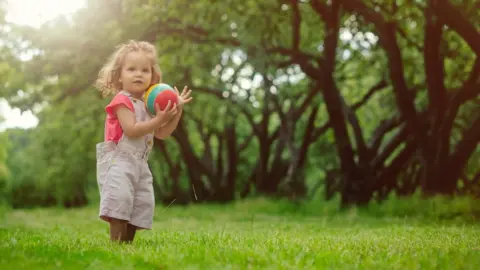 Getty Images
Getty ImagesRemember that while learning is important, at this time of unprecedented uncertainty, so are family activities, such as having fun and getting out of the house (where appropriate).
The National Trust is making its grounds free to visit so that families can get fresh air, while there are plenty of virtual tours of museums, such as those offered by Google Arts and Culture.
"Play board games, learn an instrument, bake together and let children use apps like Zoom or Skype so they can stay in touch with their friends," advises Ms Dove.
Netflix or other streaming services can be used innovatively, by watching the old movies you loved from your childhood.
Encourage reading - World Book Online has just made their collection of 3,000 ebooks and audiobooks available for free for children to access at home.
Most importantly, keep talking, especially about the future and how much you will all appreciate normal life when it resumes.